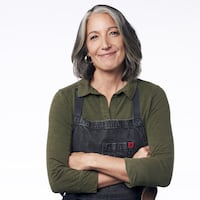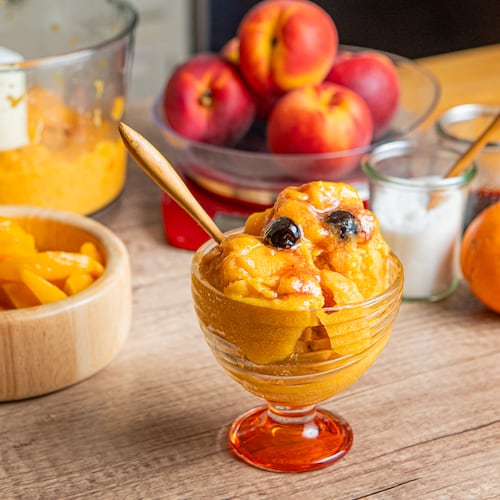On May 2, sitting in a packed house at the Lyric Opera of Chicago, I found myself feeling more like a cheerleader than a journalist, shifting from dining critic to advocate. Go Gillespie. Let it be Satterfield’s turn. Staplehouse for the win!
It was the night of the James Beard Foundation chef and restaurant awards ceremony, an annual fete frequently likened to the Oscars of the culinary world. As I walked down Upper Wacker Drive to the entrance, I glimpsed famous faces in food, clad in black ties and gowns, taking their turn on the red carpet. When you read about top toques like Marcus Samuelsson, watch them on TV, eat at their restaurants, it’s hard not to get sucked into the moment and be star-struck by their realness.
Atlantans who follow chefs and track restaurant openings like sports fanatics had a few hometown names to cheer for. Steven Satterfield of Miller Union and Kevin Gillespie of Gunshow and Revival were both in the running for best chef: Southeast. Both had been nominated in the past, and this was Satterfield's fourth consecutive nom. Gillespie had been a finalist for his 2012 book, "Fire in My Belly," but never as a regional best chef.
Atlanta also could root for the team behind Staplehouse, a restaurant in the Old Fourth Ward that was contending with five other eateries in the country for the title of best new restaurant. Staplehouse's feel-good story — it is the for-profit arm of the Giving Kitchen, a local charity that provides emergency financial relief to restaurant workers in crisis, and it is the dream of a young chef who lost a battle with cancer, his family forging ahead to turn that dream into reality — well, who can't root for that?
So, when the best chef: Southeast award went to Tandy Wilson of City House in Nashville, and when Shaya in New Orleans was named best new restaurant, I was disappointed.
I wanted to see Atlanta on the stage — again, because, just a few days earlier, Atlanta Journal-Constitution food and features writer Wendell Brock and Atlanta resident and voice in Southern cooking Virginia Willis had both received James Beard journalism awards. Brock won for best profile for his article "Christiane Lauterbach: the Woman Who Ate Atlanta," written for the Bitter Southerner, while Willis was honored with the Focus on Health Award in the cookbook category for her book "Lighten Up, Y'all: Classic Southern Recipes Made Healthy and Wholesome."
I was live-tweeting the chef and restaurant ceremonies. I reported the winners, then followed up with these remarks of 140 characters or less:
“Congrats to both @MillerUnionChef and @topchefkevin for amazing last year-plus. What would #ATL dining scene be without them? #jbfa”
“We are sure to see @staplehouseATL in #jbfa roll call for years to come. Cheers to an amazing start.”
If I felt disappointment at the outcome, what did those chefs feel?
Perhaps we need to first understand how they felt before the winner was announced.
"We were physically shaking and sweating," Staplehouse co-owner Jen Hidinger said about the day in March when she and her employees learned that the restaurant had made it to the finalist round. "To get the nod, it was completely unexpected."
The day of the Beard awards gala, Gillespie’s nerves led him to jog 20 miles. “My heart had been pounding the last 48 hours nonstop. I couldn’t stop moving. It was all I could do to keep myself from losing my mind. To be nominated is such an honor,” he said. “It is hard to explain that this is 17 years in the making.”
And when their names were not called? “You feel a tremendous sense of burden,” Gillespie said. “In my mind, that meant bringing home that award for my staff and for Atlanta.”
Satterfield chuckled when he noted that, in some ways, “you just want to keep getting nominated and never win.” While that might seem odd, he explained that the nomination brings with it exposure. “You’re on people’s radar,” he said.
Hidinger felt similar gratitude for what the James Beard accolade has done for her restaurant. “It changed our business. This national recognition is gigantic for the Giving Kitchen and Staplehouse. We’ve been given the leverage to do things — on the marketing side — to grow the inner workings of Staplehouse.”
But each of these leaders of the Atlanta culinary scene was quick to explain that getting a James Beard award, while an incredible honor, is not what drives them on a daily basis.
“It is part of a larger picture,” Satterfield said. “What drives me is doing the right thing. Trying to be on the forefront of sustainability is extremely important to me. We want to be that leader in the community. That is much more important to me than anything. It makes you work meaningfully.”
Satterfield also noted that there is a collective group beyond his peers that pushes him to work hard every day. “The diners are why we are here. If we had no diners, we wouldn’t be eligible for a Beard. They aren’t mutually exclusive.”
Thus, while we can — and should — celebrate chefs in the U.S. who are setting “new or consistent standards of excellence,” which is what the regional best chef awards honor, and celebrate a new restaurant like Staplehouse “that already displays excellence in food, beverage and service, and that is likely to make a significant impact in years to come,” the fact that Atlanta didn’t see its chefs bring back a medal in 2016 is a good reminder that winning a James Beard award isn’t the end-all, be-all. It can’t be.
James Beard is in eternal rest. He isn’t the one eating in their kitchens day after day after day. We are. And we’re not eating food only from those kitchens. We’re eating at school, corporate and hospital cafeterias. At fast-food places, stadiums, hotels.
“In my mind, the only way to win an award like that is to toil in the independent restaurant world trending toward the upper echelon,” Gillespie said.
If Gillespie is correct, chefs who helm any other type of food service operation likely never will see their names on a James Beard roll call, but their work is just as important.
“Early in my career, one of my bosses reminded me that it takes a lot of different chefs to make the world run,” Gillespie said. “There are incredibly talented people who feed thousands of people. I could never do their job.”
About the Author
The Latest
Featured

